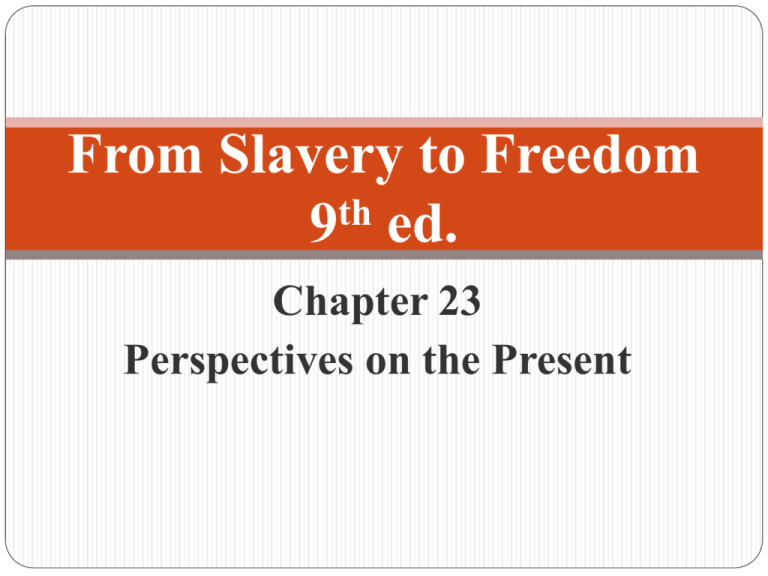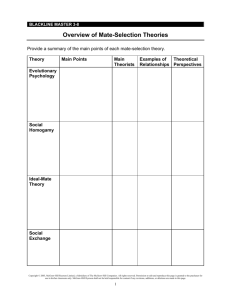
From Slavery to Freedom
th
9 ed.
Chapter 23
Perspectives on the Present
Legal Challenges
The 2000 Presidential Election
African Americans denied right to vote in Florida
Polls moved; closed early; voters purged from rolls
Despite irregularities, Supreme Court halted
recount
Vieth v. Jubelirer (2004) limited states’ ability
to create congressional districts with African
American majorities
2
© 2010 The McGraw-Hill Companies, Inc. All Rights Reserved.
Legal Challenges
Challenges to Affirmative Action
George W. Bush appointed conservatives John G.
Roberts and Samuel Alito to Supreme Court
Challenges to affirmative action
Grutter v. Bollinger – admissions policy constitutional
because it was narrowly tailored to further the
compelling state interest of diversity
Gratz v. Bollinger – struck down “points based”
admissions policy, finding the assignment of additional
points on basis of race not narrowly tailored to achieve
educational diversity
3
© 2010 The McGraw-Hill Companies, Inc. All Rights Reserved.
Legal Challenges
Voluntary desegregation plans that allowed race
to be considered as a factor for some student
assignments struck down in 2007 in cases from
Seattle in Louisville
Cases struck down long agreed on school integration
ideals outlined in Brown
Demands for Reparations
Renewed demands for reparations for slavery
Hampered by issues of sovereign immunity and statute
of limitations
4
© 2010 The McGraw-Hill Companies, Inc. All Rights Reserved.
Legal Challenges
Tulsa Race Riot Commission recommended
compensation for survivors in 2001
Legislature refused to pay; did allocate funds to
redevelop area and establish memorial
Survivors went to court; lost on grounds of
expired statute of limitations
Unsuccessful appeal to Supreme Court, where
they argued for a more favorable statute of
limitations in cases of historic wrongdoing
5
© 2010 The McGraw-Hill Companies, Inc. All Rights Reserved.
Enduring Disparities: Health,
Education, and Incarceration
Socioeconomic Stressors
African Americans have highest rates of
mortality and morbidity from almost all disease
Asthma; diabetes; cancer; cardiovascular disease
Chief factor in poor health may be where
blacks live
High density neighborhoods with environmental
pollution; substandard housing and schools, high
crime rates
Healthy food is also expensive and relatively
inaccessible
6
© 2010 The McGraw-Hill Companies, Inc. All Rights Reserved.
Enduring Disparities: Health,
Education, and Incarceration
Blacks have less access than other Americans to
private or employment-based insurance
Lack of awareness of differing cultural
perceptions of illness among medical community
The AIDS Crisis
African Americans disproportionately affected
by HIV/AIDS (50% in 2005)
Homophobia; injection drug use; the “Down Low”;
incarceration
7
© 2010 The McGraw-Hill Companies, Inc. All Rights Reserved.
Enduring Disparities: Health,
Education, and Incarceration
Incarceration and Education
47% of nation’s prison population is black;
majority are male, and 40% are between the ages
of 17 and 27
Lack of educational attainment huge factor
More Than Just Race – William Julius Wilson
Nexus of race, education, and employability
Long sentences for nonviolent drug crimes;
little rehabilitation or job-skills training in prison
Left with few options for legal employment
8
© 2010 The McGraw-Hill Companies, Inc. All Rights Reserved.
Forgotten in Hurricane Katrina
Forgotten in Hurricane Katrina
Many African Americans perceived a racial bias
in government’s response to Hurricane victims
Allocation of FEMA trailers
Disproportionately affected black and poor
population – often one and the same
Media bias; differing characterizations of white
and blacks getting food – “looting”
2006 Mayor Ray Nagin proclaimed that New
Orleans would once again be a “chocolate city”
9
© 2010 The McGraw-Hill Companies, Inc. All Rights Reserved.
New Orleans
residents in the
aftermath of
Hurricane Katrina
10
© 2010 The McGraw-Hill Companies, Inc. All Rights Reserved.
Hip Hop’s Global Generation
Hip Hop Abroad
Hip Hop used to mobilize social and political
movements, resist political marginalization, and
raise awareness of health issues
Hip Hop assumes two forms
Commercialized; identified with record industry
“Underground”; more locally-based voice
Hip Hop Nation
Members of hip hop community have become a
global community
11
© 2010 The McGraw-Hill Companies, Inc. All Rights Reserved.
Hip Hop’s Global Generation
Remaking American Hip Hop
Growing interest in reorienting the U.S. Hip Hop
generation
Project Blowed
Hip Hop for Social Change Conference
National Hip Hop Political Convention
Hip Hop Summit Action; “One Mind, One Vote”
Citizen Change; “Vote or Die”
Hip Hop entertainers became cultural
ambassadors for Obama’s campaign
12
© 2010 The McGraw-Hill Companies, Inc. All Rights Reserved.
New Great Migrations
New Great Migrations
Two important demographic trends of the
twenty-first century
Movement of large number of African Americans out
of North to the South
Increasing diversity among black population
Reverse Migration
Blacks headed south as reaction to real estate
prices, shrinking job markets, high cost of living
Greatest drain in Northeast and California; greatest
gains in Upper South
13
© 2010 The McGraw-Hill Companies, Inc. All Rights Reserved.
14
© 2010 The McGraw-Hill Companies, Inc. All Rights Reserved.
New Great Migrations
Blacks accounted for 13% of U.S. population in
2000 census
Black population not homogeneous
Quarter of increase in black population in last
decade attributed to immigration from Africa and
Caribbean
Numbers growing faster than African American
population
Significant differences among “black”
communities
15
© 2010 The McGraw-Hill Companies, Inc. All Rights Reserved.
Black
Population
Growth and
Percentage of
U.S.
Population,
1790-2000
16
© 2010 The McGraw-Hill Companies, Inc. All Rights Reserved.
New Great Migrations
Afro-Caribbean and African Migrants
Most Afro-Caribbean immigrants come from
Jamaica and Haiti
Greatest number of African immigrants come
from the sub-Saharan countries of Nigeria,
Ghana, Ethiopia, and Somalia
Diversity Visa; escape from country’s conditions
Afro-Caribbeans tend to live in mostly
metropolitan areas
More likely to overlap with African American
community
17
© 2010 The McGraw-Hill Companies, Inc. All Rights Reserved.
Emigrants from the Caribbean Admitted
to the United States, 1989-2002
18
© 2010 The McGraw-Hill Companies, Inc. All Rights Reserved.
New Great Migrations
Africans more likely to live outside metropolitan
areas in states without large black populations
More likely to reside in community where 50 percent
of residents are white
Africans generally have highest education levels
98% have high school degrees
Competing Interests and Ethnic Identities
Tension surrounding employment and social
mobility between groups
Sociologists believe foreign-born blacks “less
psychologically handicapped by the stigma of race”
19
© 2010 The McGraw-Hill Companies, Inc. All Rights Reserved.
New Great Migrations
Immigrants from majority black countries less
acutely aware of structural racism, while African
Americans hypersensitive to it
Hyper-ethnicity among black immigrants
In Search of Origins
Genetic testing technology enables blacks to
determine location and ethnicity of their African
ancestry
20
© 2010 The McGraw-Hill Companies, Inc. All Rights Reserved.
The Politics of Change
A New Campaign Style
Obama fashioned himself as new-style leader,
portraying himself as an outsider
Campaign conveyed sense of inclusiveness
Senate seat gave him a heightened degree of
political legitimacy
Central premise of campaign was change, began
at grassroots
Brought in young people; revolutionized organizing
Used Internet to mobilize support; digital strategy
21
© 2010 The McGraw-Hill Companies, Inc. All Rights Reserved.
The Politics of Change
The Democratic Primaries
Obama’s coalition of African Americans,
college-educated whites, and young voters faced
off against Clinton’s coalition of women,
Latinos, and non-educated whites
Revelations about Jeremiah White’s
inflammatory and unpatriotic remarks
March 18, 2009 Obama confronted issue by
making a stirring speech about race in America
22
© 2010 The McGraw-Hill Companies, Inc. All Rights Reserved.
The Politics of Change
The Election
Obama won 53% of vote; first time Democrat
won more than 51% since Lyndon Johnson
“The passing of an old order”
Key battleground states went to Obama
Won Hispanic vote; increased Hispanic turnout
Young voters’ role in get-out-the-vote efforts
Noticeable new voters in the electorate
President Obama’s swearing-in, historic moment
for all Americans
23
© 2010 The McGraw-Hill Companies, Inc. All Rights Reserved.







